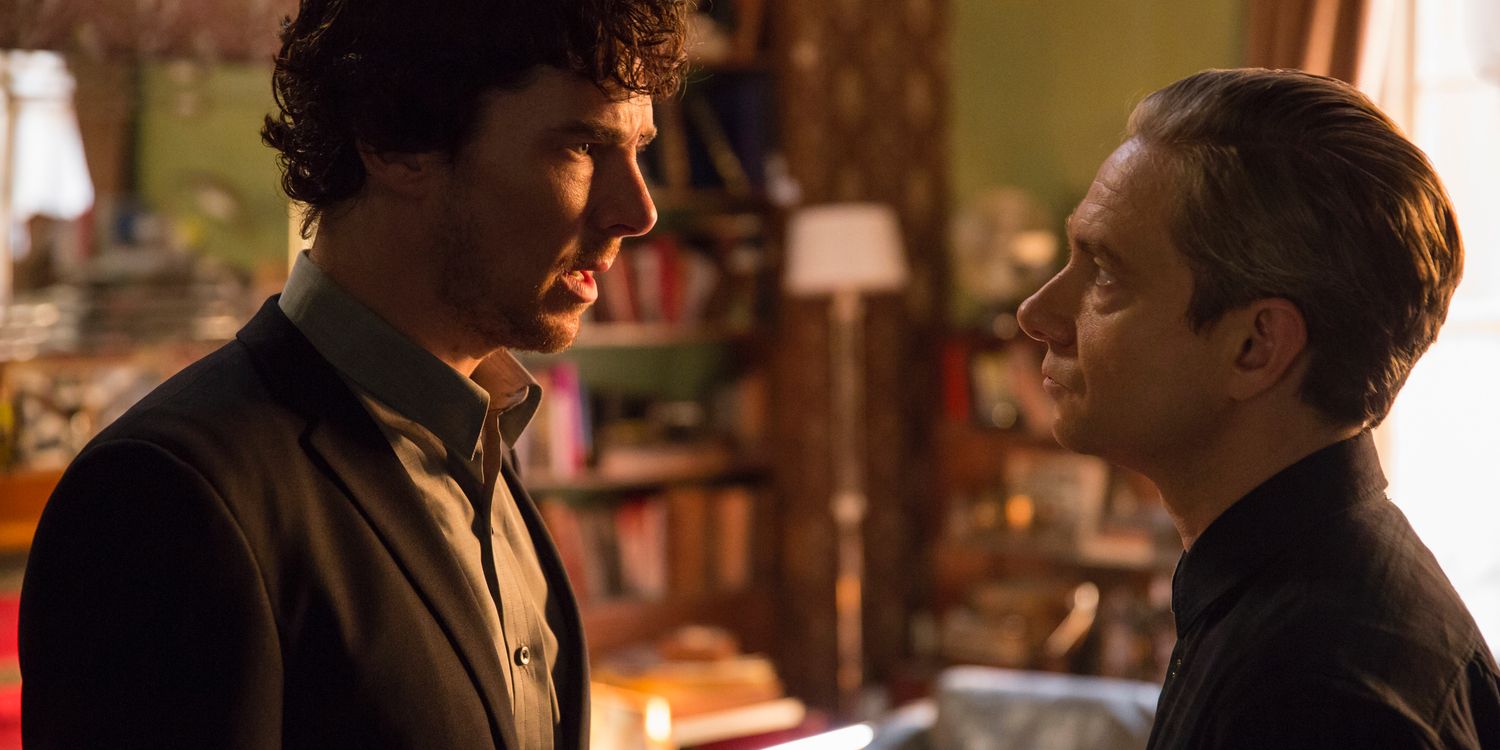There are a surprising amount of things 'The Lying Detective' demonstrates well, and one of them is how badly Sherlock needs consistency in terms of depicting its protagonist and his powers of deduction. Directed by Nick Hurran, the episode is a wild, drug-fueled ride through its main character's narcissistic efforts to get John Watson to like him again and potentially absolve him of any culpability for Mary's death during last week's 'The Six Thatchers.' By including one twist after another, the story structure itself bleeds into the deliberately jarring visual elements intended to reflect Sherlock's descent into addiction and his seemingly quixotic quest to be reunited with his friend by bringing down a serial killer who has been hiding in plain sight for years.
And yet, through the emotional desperation and a life-threatening smack habit Sherlock manages to do something that it hasn't in quite a while: make his deductions (no matter how outlandish they might seem) as fun for the viewer to watch as the show insists it is for him to demonstrate. Hurran uses a number of visual tricks to make Sherlock's various analyses something more than just a narcissist explaining the plot to characters who don't process information like he does. To do this, the episode includes a lengthy sequence where it's genuinely a treat to be in Sherlock's presence, as he breaks down a multitude of detective-y things to Faith Smith, a woman convinced her father, guest star Toby Jones as Culverton Smith, has killed someone.
Sherlock waives away imagined chalk lines denoting little clues he's picked up on, and at one point explains how he knows little details about Faith's life simply by scrutinizing (through sight, smell, taste, and touch) a single piece of paper. Like a number of the detective's deductions throughout the episode, it borders on supernatural, though that is perhaps the most consistent element 'The Lying Detective' shares with the series as a whole.
And as entertaining as it can be to see Sherlock throwing around outlandish deductions to a captive audience (the viewer and Faith… or Euros, but more on that later) with a multitude of visual aids all while telling Mycroft off, it really shouldn't require a life-threatening drug addiction in order to make Sherlock fun again. Watching Sherlock interact with Faith it's like the series rediscovered a part of itself that had gone missing amidst the demands of delivering feature-length spectacle three times every few years. It's thrilling to see, but at the same time it underlines the need for consistency in terms of how the show represents its main character.
That's especially true given that, at the end of the hour, Gatiss and Moffat introduce the third Holmes sibling they've been teasing for some time now – though not as Mycroft and Sherlock's brother Sherrinford, but a long-lost sister Euros, played by Siân Brooke. But the actual introduction is made far in advance of Euros pointing a gun at John who thinks her to be his therapist and doesn't notice she's also the woman he carried on an emotional affair with in the premiere. Brooke also plays the version of Faith Sherlock meets and who puts him on to Culverton Smith's serial killing ways. It's all a bit of sleight of hand that in some ways makes the introduction of Euros more satisfying, and in some ways makes it feel like an enormous cheat.
In setting up the reveal, Gatiss and Moffat commit to the idea that Sherlock Holmes doesn't know his own sister, much less that the woman who came to his flat seeking help is the same therapist John has been seeing. To be fair, Brooke's various performances, aided by the change in her appearance, are probably enough to have worked on the audience – though some likely will have noticed that the Faith present in the episode's opening scene with Culverton wasn't the same one who stopped by Sherlock's residence – but the audience isn't Sherlock Holmes. To that end, the reappearance of Sherlock's drug habit is as narratively convenient as the magical TD-12 Culverton uses to erase the memories of those to whom he confesses his crimes.
And yet the narrative convenience of both could have been overlooked had it afforded 'The Lying Detective' with a greater spotlight for its guest star, and for John turning the corner on his grief and anger at both himself and Sherlock. But because the episode is already stuffed to the brim – it takes a full 40 minutes before Sherlock is face-to-face with Culverton – those two elements wind up getting short shrift. For starters, it commits the sin of depicting John's grief through the tired cliché of Mary manifesting as a vision that speaks to him. What's worse, Amanda Abbington and Martin Freeman actually have a number of terrific scenes together. It's all very sweet on an emotional level, getting John to admit to her "Who you thought I was is the man I want to be," but like the drugs being used to dull Sherlock's senses in the most specific way possible, the strength of John and Mary's imaginary interactions doesn't forgive the overused reason for why they're having them.
The same goes for Culverton. Sherlock brings on Toby Jones to play an incredibly evil man, and yet provides little to sell that evil beyond telling the audience that he's a bad guy and cutting to shots of Jones cackling maniacally. There's no sense of who Culverton is as a person or what he represents to the world at large. Sherlock demonstrates he's a powerful individual and a near-constant media presence, but it never quite connects the character with the murder hospital he built, or the inexplicable notion that he would be face of a marketing campaign for a breakfast cereal that's based on the rumor he's a serial killer. The leap in logic that is required to believe Culverton is who the episode needs him to be is too great, even when his only purpose is to provide a distraction from the huge twist that Sherlock's sister is apparently a part of Moriarty's plan to exact vengeance from beyond the grave. It all adds up to 'The Lying Detective' being a mixed bag of entertaining Sherlock set pieces and the show reaching too far to set up a surprising endgame.
-
Sherlock continues next Sunday with 'The Great Game' @9pm on PBS.
Photos: PBS



